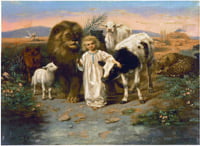Psalm 149 consists of two themes. In the first half of the Psalm, the songwriter sings a song of praise to the Lord, a song of rejoicing which included musical instruments and dance. The praise reinforces the promise of hope and salvation from God. The latter portion of the Psalm takes a more somber turn with a call to judgment upon kings, nobles and nations as executed by the saints of God through the use of a two-edged sword, chains, fetters and vengeance. What a contrast and contradiction! Romans 11:22 explains: “Therefore consider the goodness and severity of God: on those who fell, severity; but toward you, goodness if you continue in His goodness.”
Revelation 15:3,4 prophesies that as a result of the judgments on the earth (the sinful world order under Satan), the nations will worship God! “They (the saints) sing the song of Moses, the servant of God and the song of the Lamb, saying: Great and marvelous are your works, Lord God Almighty! Just and true are your ways, O King of the saints! Who shall not fear you, O Lord and glorify your name? For you alone are holy, For all nations shall come and worship before you, For your judgments have been manifested.” These saints referred to in Revelation 19 are also the ones in Psalm 149.
It may appear that this Psalm was written as an exuberant call to praise God by the nation of Israel, but the use of the phrases “assembly of saints,” “children of Zion,” and “saints be joyful” are titles used in reference to the church of Christ. (See Hebrews 12:22; 1 Corinthians 1:2)
The church of God will indeed participate in the judgment work mentioned in the Psalm (the “honor of all the saints”). Revelation 2:26 was our Lord’s promise to the church, “And he who overcomes, and keeps my works until the end, to him will I give power over the nations and he shall rule them with a rod of iron, they shall be dashed to pieces like the potter’s vessels.”
1 Corinthians 6:2 says, “Do you not know that the saints will judge the world?” The judgment of the world is linked to the return of our Lord. This places the timing of Psalm 149 at the end of the Christian age and just prior to the ushering in of the glorious kingdom of God. These end-time saints have the privilege of wielding the “sword of truth.”
Please remember that the Christian’s weapons are not mankind’s weapons. 2 Corinthians 10:3-5 (NKJV): “For though we walk in the flesh, we do not war according to the flesh. For the weapons of our warfare are not carnal but mighty in God for pulling down strongholds, casting down arguments and every high thing that exalts itself against the knowledge of God.”








